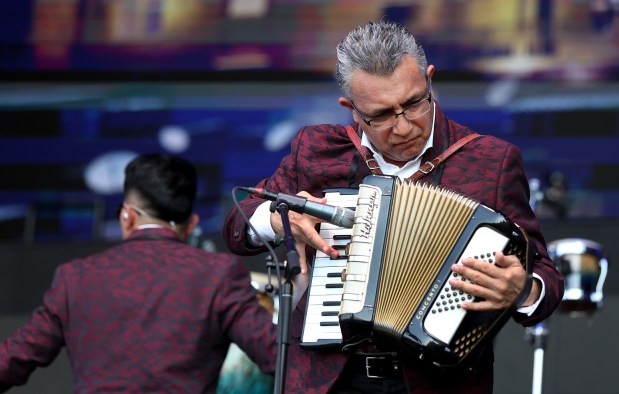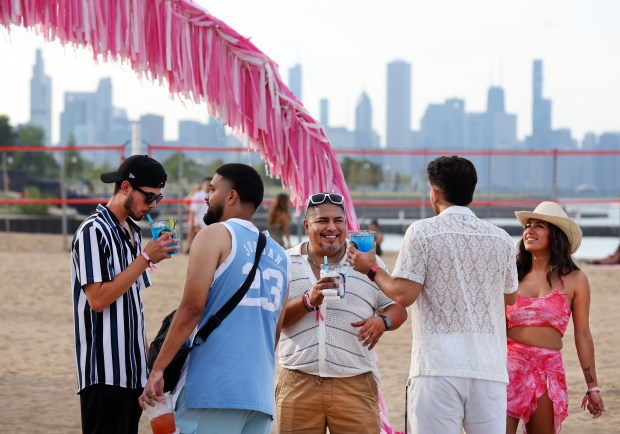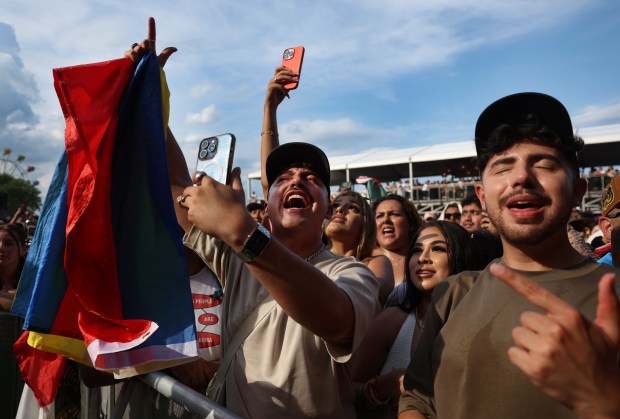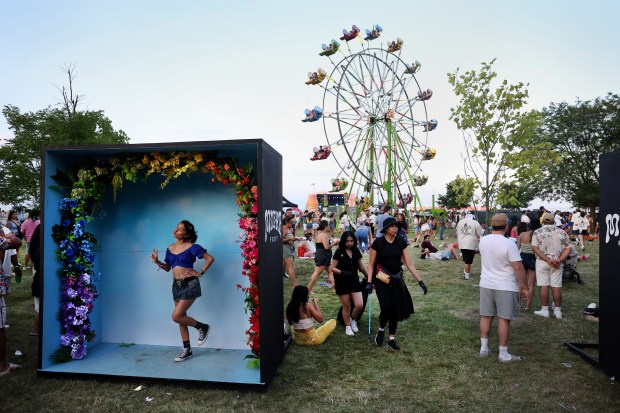Six years ago, Michelada Fest started out of an empty parking lot in Pilsen when Fernando Nieto said he realized that most of the street festivals in the neighborhood were organized by non-Latinos. With some help from friends and community members, he created a festival to celebrate Mexican culture.
Thousands of people showed up the first year, forming lines to try the namesake drink of beer mixed with spice and tomato juice while enjoying a Chicago summer day. Its growth since then has been exponential, sometimes challenged but also celebrated.
Miche Fest, short for Michelada Festival, is now one of Chicago’s largest Latino music festivals, bringing together thousands of people from all over the city and featuring world-renowned artists who speak to different generations of Latinos.
For the first time since its inception, the festival this last weekend no longer took place in Pilsen. Miche Fest was at Oakwood Beach, and featured Kali Uchis, Los Angeles Azules, Junior H and a number of other Mexican American regional artists that have been charting hits.
The transition solidified the event as a musical festival and fulfilled Nieto and his partner Miguel Torres’ dream of becoming one of the few Latino promoters and event organizers in the city, he said. Many attendees compared it to Sueños, a festival backed by the city of Chicago and organized by Lollapalooza promoters.
As Nieto overlooked the crowd and the festival grounds from the main stage — with Chicago’s skyline as the background and the blue of Lake Michigan surrounding them — he reflected on their beginnings.
“We’re doing this,” he said, crediting the staff.
Both Nieto and Torres are South Side natives and children of Mexican immigrants.
Nieto, who was born and raised in Pilsen, began organizing festivals in 2013 out of his love for the music scene and his culture, he said. It started with My House Music Festival, Pilsen Taco Fest, Dia de la Concha and others mostly funded by grassroots groups, friends, and volunteers.
Miche Fest took his vision to a whole different level, he said.
“We outgrew it almost immediately,” he recalls. When they first hosted Miche Fest in Harrison Park in 2019 from the parking lot near Cermack Road, he was proud because that park is where he played as a child and where his daughter plays softball. He partnered with Torres right around that time, with hopes of growing it even more.
“There’s not a lot of Latino organizers in the city and as a community, we are underrepresented even if we have one of the largest Latino demographics in the country,” Nieto said. “I’ve always been an advocate that the South Side can have really cool events too, not everything needs to be in the Grant Park of the North Side.”
Torres shares that same vision.
His inspiration, he said, comes from his father, a former community leader who advocated for more Latino representation in union jobs around the city.
So their partnership was organic, the two said.
“I’ve always had this passion to make sure that things that I do are impactful, not only for financial purposes, but also for the community,” Torres said. Though he was born in Brighton Park, he was mostly raised in Pilsen, where he is now also a small business owner.

“We both mutually knew what this meant for the city, for our community, and we both carry that heavily on our backs,” Torres said.
Despite the summer heat and some storm warnings that delayed the start of the second day this year, the festival went on, ending with a fireworks show while their headliner, Junior H, sang “El Azul,” one of his top hits.
“It felt like a dream,” Rosy Sanchez said. While some complained about the wait times to get in and some logistics inside the festival, for the most part, attendees were excited about the Michelada Fest-turned-beach party, this time featuring two stages and an elevated VIP experience, all far from the few blocks of Michelada stands in Pilsen six years ago.
Nieto credits its success to that: “We bring artists that our parents love, those that we learned to appreciate, while also keeping up with the younger generation.”

When the festival was first hosted in Harrison Park, the entry fee was only $5. At the time it mostly featured more local artists.
“Imagine what it meant to have Bronco play in your backyard?” Torres asked. Bronco is a Mexican grupero band originating from Apodaca, Nuevo León, Mexico that was popular in the ’80s and ’90s. It was one of the first few top bookings Nieto and the team landed in 2022.
That’s when the number of attendees took off, causing some of their Pilsen neighbors to complain that the festival was blocking park access and parking for residents, as well as harming the environment.
At the time, Nieto and Torres attempted to dialogue with residents, offering free tickets, creating space for local vendors and hiring youth for the event.

“But as much as we love Pilsen, we outgrew it and we knew we needed more space,” Nieto said.
Attendance was reported as more than 10,000 per day.
Putting a music festival together is “not easy, and perhaps not even very financially rewarding,” Nieto said. The two recognize that financial risks are high, sometimes even causing them to lose money over the years, but their aspirations and vision are much bigger.
“I do it because my mom calls me ‘terco,’ (stubborn). A dreamer,” he said. “I take a lot of pride in having the Latino name during those conversations and negotiations.”
Torres said he hopes their commitment to creating the festival space can have a generational impact that inspires other young Latinos to do the same.
larodriguez@chicagotribune.com



